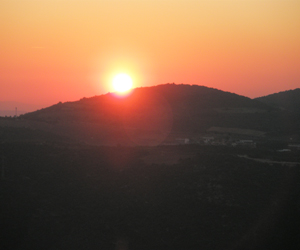Batya Avraham: A Return To Roots
An Ancient Heritage
Growing up in an unaffiliated Catholic home in the mid-1950s, Batya Avraham never game much thought to her roots. She knew that her mother's family had come from Cuba, and before that, Spain, but she had very little else to go on to connect with her family's religious and spiritual background. "The family name was a Jewish name" Batya says "but there's no proof, no way to show definitely that they were Jewish".
Proof or not, as Batya began to raise her family, she felt herself pulled more and more in the direction of the Old Testament. Although they lived in the South, in areas of Louisiana, Texas and Tennessee where no Jews were to be found, she and her husband decided, on their own, to try and follow the precepts of the Torah.
"We didn't know that there was an Oral Law" Batya says. "All we knew about was the Written Law. So that's what we followed."
Jews believe that the Torah was given to Moses at Mt. Sinai. There are, in the Torah, six hundred and thirteen commandments which religious Jews believe G-d expects them to follow. This is the Written Law.
Throughout the ages, as Jews began to be exiled and dispersed throughout the world, the rabbis began to codify these laws, writing explanations and commentaries which enable Jews to understand how to best follow the laws. Beginning with the Talmud in the 1st century A.D., each generation of Rabbis has added to our understanding of the Written Law- a religious Jewish home today can have thousands of books which are the commentaries on the commentaries on the commentaries - thousands - on the Written Law. This is the Oral Law.
Jewish history has seen groups who refuse to accept the Oral Law, and who hold only by the written law -- Kararites and Samaritians. They, however, have broken off from normative Judaism. For instance, when the Torah says that it is forbidden to light a fire on the Sabbath, Jews will follow the rabbis' rulings which allow them to light a fire BEFORE the Sabbath and warm up their food on that already-lit fire. Samaritians and Kararites will eat cold food throughout the Sabbath day.
Searching Her Roots
For many years, Batya and her husband followed the Written Torah as well as she could, without a community or teacher. But after her divorce, Batya began to feel that something was missing from her spiritual life, and started to explore Judaism. She moved to Tzfat, sight-unseen, with almost no savings or job opportunities, yet something told her that this was the place where she would find her spiritual home.
Today, Batya studies with local teachers, and is preparing for a formal conversion to Judaism. Her community supports her, and she is slowly learning the intricacies of modern Jewish life. Her days of trying to figure out Kashruth (the Jewish dietary laws) on the Bayou are over....there are plenty of neighbors and friends to help her in her entrance to the Jewish World.
Batya now lives in Tzfat. Her oil paintings reflect her journey. She can be contacted at [email protected]

